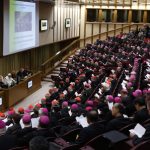Each day consists of one thousand four hundred forty minutes. Every person has exactly that same number of minutes. The most important question is whether I am using those minutes to achieve the purpose for which I have been created. My task, here, is to share a smidgen of wisdom about the best ways to steward those 1440 minutes, for God’s greatest glory and achieving the lofty end to which I have been called.
The best way I can find to examine the question is according to two distinct, but intimately related, triumvirates (sets of three things). The first triumvirate consists of the faculties of the human person: the body, the mind, and the soul; and the second consists in the transcendental realities that every human person seeks: truth, goodness, and beauty. Living each day intentionally while seeking to cultivate these faculties and move toward these transcendentals allows me to make the best use of the finite amount of time granted.
At the outset, it is important to realize that these movements and operations do not happen in clear linear succession. Rather, each element is connected to all the others, sometimes inseparably. Many of these things are happening at the same time, in singular actions. Still, it is really only possible to treat them systematically.
Among my first considerations must necessarily be my basic bodily needs. My body will become unfit for full and active stewardship if I do not have adequate rest along with appropriate nourishment and exercise. This is an important, foundational truth because, quite simply, the right functioning of my body enhances or limits the other aspects of my life. So, I ought to keep in mind St. Paul’s exhortation: “I appeal to you therefore, brothers, by the mercies of God, to present your bodies as a living sacrifice, holy and acceptable to God, which is your spiritual worship” (Rom. 12:1). Caring for the gift of my body is an act of stewardship. Yes, sleeping, eating, and working out can be acts of prayer and worship.
In addition to my body being rested, nourished, and primed for activity, I need to consider intellectual exercise. After all, the things I know affect the things I do—dramatically. Therefore, it is imperative that I spend some part of each day fostering my mind. In the same passage quoted above, St. Paul exhorts his readers to “be transformed by the renewal of your mind” (Rom. 12:2). Whether it is by doing crossword or sudoku puzzles, engaging in scientific research, watching documentary films, or reading great literature, stewarding my mind in a healthy, ordered way will have a significant impact on my body and my relationships.
Along with my body and mind, my soul must be stewarded and primed. If I desire to attain the end that God has in store for me, then I must put my soul in a position to be elevated. Such small efforts could include daily Mass, Eucharistic Adoration, lectio divina (praying with Scripture), or praying a daily examen. The graces received from any of these actions, then, will undoubtedly flow over to my mind and body. Call it “trickle-down” grace.
When my body, mind, and soul are in right order, I can encounter truth, goodness, and beauty more fully. I can even be an effective agent of helping others encounter those transcendental realities. If I have stewarded my soul well through prayer and sacraments, I will be able to notice God’s movements in my life and in others’ lives with more clarity. I might even be capable of leading or mentoring others in the search for wholeness and beatitude. If my soul is strengthened, along with my body, I will be able, even inspired, to bring goodness into the world through the spiritual and corporal works of mercy. If my body is cared for rightly, I will come to know more of God’s existence through my senses; and I will be a fit agent of God’s love to others through my works. See how all these things are woven together?
Because all these realities are woven together, some of them inseparably, it can be a challenge to discern what to do and when. On a very practical level, then, it is essential that I pray with my calendar, my daily schedule. The prayer simply becomes, “Lord, how would you have me spend today? How will your glory be most manifest in the 1440 minutes you have granted to me? What do I need for my soul, my mind, and my body? What gives me energy and inspiration? Grant me the grace to commit and see the plan to completion.”
Still, I might feel unworthy or incapable. Or, I might simply feel scattered because there is too much to consider. I might feel what St. Augustine expressed near the end of his great spiritual autobiography, Confessions: “I am divided up in time, whose order I do not know, and my thoughts and the deepest places of my soul are torn with every kind of tumult . . .” (Book XI, Chapter 29). Yet, on either side of that brief thought, the great theologian expressed the understanding that the ultimate order and peace of God was his deepest desire. And, he knew that he would only find that in eternity, not in this world.
All these considerations seem to culminate in an oft-quoted axiom about the spiritual life, sometimes (probably falsely) attributed to Augustine: “Pray as if everything depends on God, and work as if everything depends on you.” The proper stewardship of human faculties and gifts, of my body, mind, soul, and time, will not happen if I am not in right relationship and open communication with the Creator, the Gift-Giver. Beyond that, the Gift-Giver is so generous and humble that He expects me to act to bring about His plan!
So, I set out to spend each allocation of 1440 minutes, each day, paying attention to God’s voice and acting in fidelity to what I receive. I hope to seize this day!
Photo by Andrik Langfield on Unsplash















